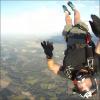Link to source
Mushrooms' active ingredient expands the mind, study finds
By David Brown
The Washington Post
Psilocybin, the active ingredient of "magic mushrooms," expands the mind. After a thousand years of use, that's now scientifically official.
The chemical promoted a mystical experience in two-thirds of people who took it for the first time, according to a new study. One-third rated a session with psilocybin as the "single most spiritually significant" experience of their lives. Another third put it in the top five.
The study, published today in the journal Psychopharmacology, is the first randomized, controlled trial of a substance used for centuries by natives of Mexico and Central America to produce mystical insights. It is also nearly the first research on a psychedelic drug in human subjects in this country since the 1960s. It confirms what both shamans and hippies have long said: Taking psilocybin is a scary, reality-bending and occasionally life-changing experience.
The researchers hope the experiment opens a door to the study of a class of compounds that alter human perception and erode the boundaries of self — at least in some users. They hope it will provide new insight to how the brain works and what neurochemical events underlie moments of mystical rapture.
Rigorous study of psychedelic drugs has been shunned since the 1960s, although it is not illegal. Research on them was a casualty of the muddled mix of science and advocacy by people such as Timothy Leary, the LSD guru and former Harvard psychologist once called the "most dangerous man in America" by President Nixon.
"Our study has shown we can conduct a study of this type safely, and that the effects produced are really quite interesting," said Roland Griffiths of Johns Hopkins University School of Medicine, who ran the experiment. "There is a clear neuroscience agenda to understand those effects, and clear clinical applications that could be pursued."
The study, which involved 36 middle-aged adults from the Baltimore-Washington area, was conducted over five years. The subjects were chosen from 135 people who answered newspaper ads. All said they were members of a religious organization, practiced meditation or took part in other spiritual activity.
The volunteers were randomly assigned to take either 30 milligrams of psilocybin (chemically synthesized, not extracted from mushrooms) or 40 milligrams of methylphenidate, the stimulant sold as Ritalin.
The sessions lasted eight hours in a room where a person could listen to music, relax on a couch with eyeshades or talk with two monitors always in attendance. Each subject then took the other drug in a different session two months later.
Of the 36 people, 22 had a "complete" mystical experience as judged by several question-based scales used for rating such experiences. Many reported feelings of joy and peace, and a sense of transcending time and space. Two-thirds judged it to be among their top-five life experiences, equal to the birth of a first child or death of a parent.
Two months after a session, the people who had taken psilocybin reported small but significant positive changes in behavior and attitudes compared to those who had taken Ritalin. Many participants said it had left them feeling kinder and happier than before — persistent changes that scientists corroborated through interviews with families, friends and co-workers.
One-third of the subjects, however, said they experienced "strong or extreme" fear at some point in the hours after they took the hallucinogen. Four people said the entire session was dominated by anxiety or psychological struggle.
David Nichols, a professor of medicinal chemistry at Purdue University, who was not involved in the research, said that last finding should give people pause.
"I think these drugs are potentially very dangerous," he said. "I would be very disappointed if in any sense these results were used to encourage recreational use of these compounds."
Material from The Baltimore Sun is included in this report.
Copyright © 2006 The Seattle Times Company
















































